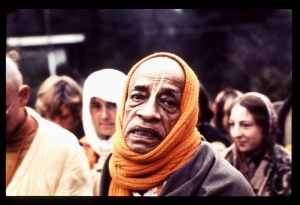CC Madhya 5.159

A.C. Bhaktivedanta Swami Prabhupada
TEXT 159
- brahmaṇya-deva-gopālera mahimā ei dhanya
- nityānanda—vaktā yāra, śrotā—śrī-caitanya
SYNONYMS
brahmaṇya-deva — the Supreme Personality of Godhead, who is merciful to the brāhmaṇas; gopālera — of Gopāla; mahimā — glories; ei — these; dhanya — glorified; nityānanda — Lord Nityānanda Prabhu; vaktā — the speaker; yāra — of the narration; śrotā — the hearer; śrī-caitanya — Śrī Caitanya Mahāprabhu.
TRANSLATION
The glories of Lord Gopāla, who is merciful to brāhmaṇas, are very great. The narration of Sākṣi-gopāla was spoken by Nityānanda Prabhu and heard by Śrī Caitanya Mahāprabhu.
PURPORT
There are four points of instruction one should consider in the story of Sākṣi-gopāla. First, the Deity (arcā-vigraha) of Śrī Gopāla is eternally sac-cid-ānanda-vigraha (BS 5.1), the transcendental form of the Lord. Second, the Deity surpasses material regulative principles and extends the reality of transcendental principles. Third, one can be situated in a transcendental position after becoming a brāhmaṇa, but as a brāhmaṇa, one has to follow the regulative principles very strictly. Lastly, brahmaṇya-deva indicates Lord Śrī Kṛṣṇa Himself, who is worshiped thus: namo brahmaṇya-devāya go-brāhmaṇa-hitāya ca/ jagad-dhitāya kṛṣṇāya govindāya namo namaḥ. This indicates that a devotee who is under the protection of Kṛṣṇa is automatically situated as a brāhmaṇa, and such a brāhmaṇa is not illusioned. This is factual.